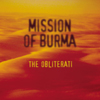Mission of Burma, "The Obliterati"
 Never a group content to rest on their laurels, Mission of Burma's third studio album and their second since reforming after a 20 year hiatus finds them raising the bar higher than ever with surging guitars, pummeling rhythms, and some other surprises that show a remarkable growth and renewed vitality in their songwriting.
Never a group content to rest on their laurels, Mission of Burma's third studio album and their second since reforming after a 20 year hiatus finds them raising the bar higher than ever with surging guitars, pummeling rhythms, and some other surprises that show a remarkable growth and renewed vitality in their songwriting.
When I heard about their reunion a few years back, I was glad that they were giving themselves the opportunity to enjoy the fan base that had grown around them in their absence since their premature dissolution. Yet when they took that a step further and announced an album of new material, I was afraid they might be tempting fate by risking their legendary status with songs that betrayed the fact that they hadn't played together in so long. In some ways, the resulting ONoffON did little to assuage my doubts. The stronger songs were from the later end of Burma's first era and the others showed signs of rust as they overreached a bit trying to figure out whom exactly their new audience was. As a result, I wasn't terribly excited when I found out about the release of The Obliterati, but I had no reason to worry as it has in abundance everything I thought the previous album lacked.
Something I've always liked about Burma is how democratically they operate. No instrument is more important than another, and yet each element remains distinctively compelling within the whole. From the beginning they're tight and crisp as"2wice" hits with punchy drums that eventually culminate in a stunning anthemic statement that other lesser bands spend an entire album trying to discover, yet Burma's only getting started. Their sense of dynamics has always been one of their strengths, and in that respect this album is no different, such as on "Spider's Web" when they use space as a compositional tool or the beginning of "1001 Pleasant Dreams," which effectively builds tension. This also works on a larger scale in the way they sequence their songs, keeping things fresh by building momentum and then changing the pace, whether from the straight thrust of "Man In Decline," the slower yet effective "Period," or the instrumental "The Mute Speaks Out."
One thing that's a little different is the way they use vocals this time out. The first couple of tracks have unexpected harmonies and falsettos, but it's not until "Donna Sumeria" that the vocals steal the spotlight in a harmonic break that harkens back to Motown without straying too far from their own sound. The good thing about the chances they take with the singing is that they work. Even the unholy, airy chorus in "Nancy Reagan's Head" feels like a natural diversion rather than something arbitrary. Lyrically, they've retained their passion and conviction even while exploring some tender thoughts without having to sacrifice the music in the process. Of course they still have their smart-ass sense of humor, epitomized when they take a shot at our Former First Lady on, appropriately enough, "Nancy Reagan's Head": "And I'm haunted by the freakish size/Of Nancy Reagan's head/No way that thing came with that body." Bob Weston deserves a lot of the credit for the sound of this album. Not only does he make every element sound vitally important and unique, but the various loops and other noises he adds in Martin Swope's former role are exquisitely placed within both the songs' structures and the mix itself.
With this album, Burma prove that whatever curse may have hung over them in a previous era is long gone and rather than merely deserving success, they've done more than enough to earn it.
samples:



